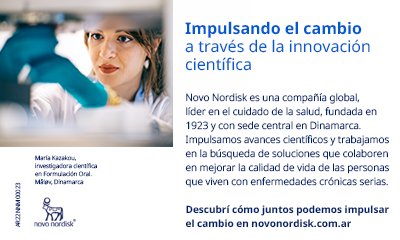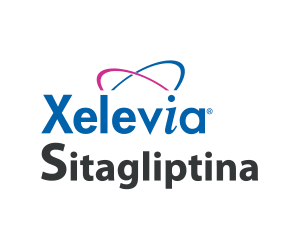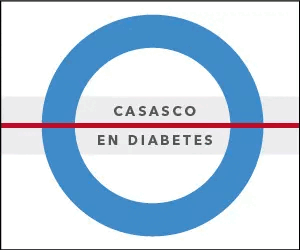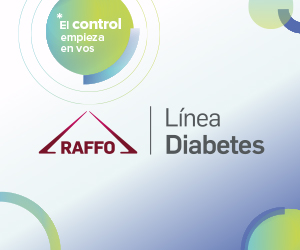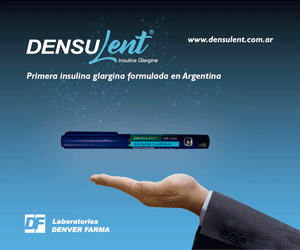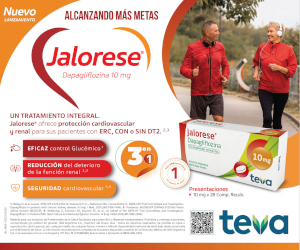P53 Pharmacological diabetes approach in patients with solid organ transplantation
DOI:
https://doi.org/10.47196/diab.v54i3Sup.439Keywords:
pharmacological approach, diabetes, solid organ transplantAbstract
Background: Diabetes mellitus (DM) is a complication of solid organ transplantation and generally treated with insulin, recently new therapies have been implemented with good results.
Objetive: We describe and evaluate pharmacological diabetes therapy in patients undergoing solid organ transplantation, as well as its impact on glucometabolic control.
Method: This is an observational, retrospective study. We include solid organ transplantation patients with a post-transplant DM or pre-transplant DM diagnosis, who attended to a medical consultation between 7/2015 and 8/2019. Patients with less than 2 medical consultation in a period of 2 years were excluded. HbA1c levels and estimated glomerular filtration rate (eGFR) using the CKD-EPI equation were evaluated. The rate of change of immunosuppressive therapy and pharmacological diabetes therapy at 3, 6, 12, 18 and 24 months of follow-up was described. Statistical method: qualitative variables are described in absolute frequency / percentage and the quantitative variables in median / range according to their distribution. Nonparametric tests and Fisher's test were used to analyze differences.
Results: Forty-nine patients 24.5% (n = 12) with pre-transplant DM and 75.5% (n = 37) with DMPT were included, 63.3% (n = 31) were men. Median age was 60 years (21-79). Median baseline HbA1c level was 6.8% (5.3-11.5). Types of transplant: 47% (n = 23) renal, 12% (n = 6) bi-pulmonary, 16% (n = 8) cardiac, 20% (n = 10) hepatic and 4% (n = 2) hepato-renal. Pharmacological diabetes therapy: 28.6% (n = 14) with oral antidiabetics (OAD), OAD and insulin 22.4% (n = 11) and insulin 49% (n = 24). ODAs were: metformin 35% (n = 17), sulfonylureas 6% (n = 3), iDPPIV 24% (n = 12), TZD 2% (n = 1), iSGLT2 2% (n = 1). Immunosuppressive therapy, 86% (n = 42) with glucocorticoids and most of these associated with tacrolimus and mycophenolate. No significant differences were found in the variables analyzed during follow-up (Table 1). No differences were found between HbA1c or eGFR in the subgroups of previous DM (p = 0.416 and p = 0.553) and DMPT (p = 0.416 and p = 0.238).22.4% (n = 10) of patients registered changes in immunosuppressive therapy: 5 patients at 3 months, 1 patient at 6 months, 2 patients at 12 months and 2 patients at 18 months; no cases of organ rejection were reported. Meanwhile, pharmacological diabetes therapy was modified in a single case at 6 months of follow-up.
Conclusion: Oral antidiabetics, and not only insulin, allowed to achieve a good metabolic control throughout the follow-up, in this group of patients, without deleterious transplantation effects; so they could be considered to simplify and improve adherence to treatment.
Downloads
Published
How to Cite
Issue
Section
License

This work is licensed under a Creative Commons Attribution-NonCommercial-NoDerivatives 4.0 International License.
Dirección Nacional de Derecho de Autor, Exp. N° 5.333.129. Instituto Nacional de la Propiedad Industrial, Marca «Revista de la Sociedad Argentina de Diabetes - Asociación Civil» N° de concesión 2.605.405 y N° de disposición 1.404/13.
La Revista de la SAD está licenciada bajo Licencia Creative Commons Atribución – No Comercial – Sin Obra Derivada 4.0 Internacional.
Por otra parte, la Revista SAD permite que los autores mantengan los derechos de autor sin restricciones.


